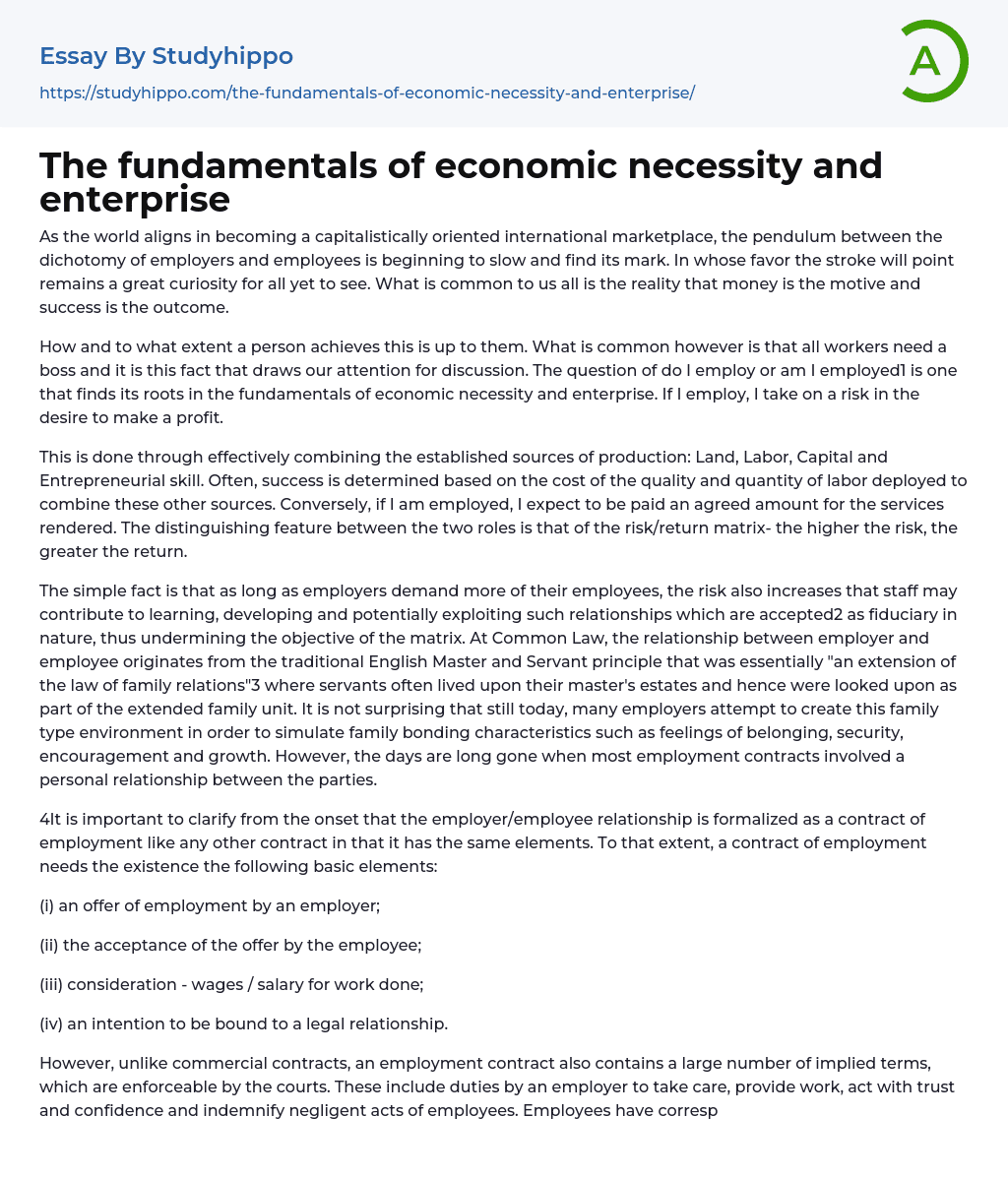

The fundamentals of economic necessity and enterprise Essay Example
With an increasing global emphasis on capitalism and international trade, the relationship between employers and employees is gradually stabilizing. The ultimate beneficiary of this dynamic remains uncertain, but it is widely acknowledged that money serves as the motivating factor with success as the ultimate objective. The path to achieving this desired outcome differs for each person. Nevertheless, a constant aspect prevails - every worker necessitates a supervisor. This fundamental reality will be our primary focus of discussion.
The question of whether I am an employer or an employee is based on economic necessity and enterprise. As an employer, I take risks to make a profit by effectively combining production sources like Land, Labor, Capital, and Entrepreneurial skill. Success often depends on the cost and efficiency of labor involved in using these sources. On the other hand, as an employee, I expect to receive a predetermined payment for my
services.
The risk/return matrix is crucial in distinguishing the roles, as the return rises with an increase in risk. However, demanding more from employees also raises the risk of exploiting fiduciary relationships, which undermines the matrix's objective. In Common Law, the employer-employee relationship resembled a familial bond based on the Master and Servant principle. Employers still strive to foster a familial atmosphere to encourage bonding and growth among employees. Nevertheless, modern employment contracts often lack personal connections between parties. It is worth noting that the employer-employee relationship is formalized through an employment contract, sharing similarities with other contractual agreements in terms of its elements.
An employment contract comprises several crucial elements: an offer of employment, acceptance of the offer, consideration (wages/salary), and intention to establish a legal relationship. Additionally, ther
are implied terms within the contract that courts can enforce, assigning responsibilities for both employer and employee. The employer has obligations such as providing care for the employee, assigning work tasks, acting in good faith with trust and confidence, and compensating for negligent acts. Conversely, the employee must display loyalty towards the employer by acting in good faith, following instructions diligently, exercising care and skill, taking responsibility for property, and promptly responding to inquiries. Controversy arises from the duty of mutual trust and confidence since it originates from common law principles dictating that employees should cooperate and remain faithful.
This essay will examine the fiduciary nature and obligations between employers and employees (Part A). Additionally, it will explore the duty of good faith or fidelity, which encompasses a range of obligations an employee must fulfill to protect their employer's interests (Part B). The section will also discuss how the courts assess these obligations during and after employment, along with the limitations employers face when reinforcing these duties through restrictive covenants. Lastly, Part C will highlight the emerging duty of mutual trust and confidence from the United Kingdom, which imposes similar obligations and responsibilities on employers as a counterpart to the employee's duty of fidelity. This duty is gradually gaining acceptance in Australia.
- Culture essays
- Social Control essays
- Citizenship essays
- Social Justice essays
- Caste System essays
- Social Responsibility essays
- Socialization essays
- Deviance essays
- Modern Society essays
- Popularity essays
- Civil Society essays
- Community essays
- Female essays
- Filipino People essays
- Igbo People essays
- Indigenous Australians essays
- Indigenous Peoples essays
- Minority Group essays
- Social Institution essays
- Men essays
- The nation essays
- Middle Class essays
- Social Norms essays
- Discourse Community essays
- Popular Culture essays
- Car Culture essays
- American Culture essays
- Mormon essays
- Indian Culture essays
- Mexican Culture essays
- Pop Culture essays
- Cultural Differences essays
- Culture Shock essays
- Different Cultures essays
- Profession essays
- Labour Economics essays
- Occupational Safety And Health essays
- Pension essays
- Salary essays
- Strike Action essays
- Wage essays
- Career essays
- Workplace essays
- Homeless essays
- Working Together essays
- Career Path essays
- Hunter essays
- Farmer essays
- Nurse essays
- Pilot essays



